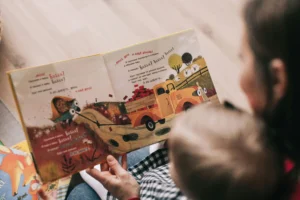Have you ever witnessed another mom doing incredible things – all the while embracing consequences? I witness this quite often, though one recent memory stands out.
I was at a fast-food restaurant and decided to go inside as the drive through was notorious for forgetting something. I got in line behind a woman who if anyone deserved a spa day, it was her. She was corralling five, yes five, little ones. Here I thought I was impressive with 2 out in public and she is showing me up twice over. I felt like giving her a hug.
This restaurant is known for its Happy Meals, and of course we all know the top-quality toys that accompany such meals. Back in my day, they actually were fairly good prizes. I remember many a Halloween trick or treating with my Happy Meal Pumpkin or building a sandcastle with my Happy Meal Boats. Maybe I am aging myself. I digress.
I watched as it was nearing the moms turn to order and her kids giddy with excitement, discussing what they might find inside their box. As the mom ordered, and I might add, she was very patient with each of her children as they decided between a cheeseburger or nuggets and relay the order to a young cashier who if there was ever any better form of birth control, it was jumping up and down in front of her.
As I watched this kid tornado start to form, and much to my surprise, the mom turned to her eldest child and without raising her voice, and while staying calm, asked him to gather his siblings, find a table and sit quietly until she got there with the food. I was shocked! Most moms usually lose their sh*t publicly while the rest of us look on sympathetically, knowing that this was not an indication of their ability to parent, rather just one of those times the kids are beyond excited and reeling that in is like catching a shark on a fishing line and trying to control it.
The young boy she had spoken to collected his younger brothers and sisters, and led them to a table as I wondered if he was available for babysitting, and they obeyed him, sitting quietly with excitement evident with the smiles on their faces.
As the woman walked past me, she caught my eye, and probably mouth open agape at what just transpired, and I complimented her on what great children she had. She replied with a smile, and said “Thank you, it’s taken a lot of consistency. It wasn’t always this way.” She walked away with her tray of food for her kids while I digested what she had said, knowing exactly what she meant.
I detected the underlying message in her reply. While we witness children behaving, we are not privy to behind the scenes and how they learn – about embracing consequences.
I smiled in response as she walked away with a large tray of Happy Meals. I was aware of the hidden meaning behind that statement. While her children were very well behaved now, I know the time she and perhaps even her significant other had put into working with their children on manners and behavior, embracing consequences and taking turns being the enforcer.
I wanted to relay that story to you as our topic of discussion today will be all about embracing consequences – the good and bad of them.
Embracing consequences allow us the opportunity to assist our children with the tools to grow into better people. It enables us to take a hard look at our parenting skills, turning our attention on how we can better ourselves as parents, and as people, too.
Taking a look at the age groups, the most “out-of-control” kids falls into the toddler range. Toddlers most often do not face consequences. They are often rewarded when they react favorably, often time, they are looked over, and met with indifference and sometimes, even anger, when they act out of line, and when this happens, it escalates for them creating a lack a self-responsibility as they grow.
Toddlers are a tricky age because as they grow out of the baby phase, they are more often than not complimented on everything they do. Think of all the times they are rewarded with no threat of a consequence; learning to crawl, then learning to walk. Eating with a spoon or fork, not a bottle, using the potty, etc. They are so used to praise that embracing consequences is a difficult transition for them and it is met with tears and frustration.
(I wanted to add a note here; behavior by a child that creates anger in parents is not a consequence for their children. Creating an emotion in a parent is simply triggering a reaction, and regardless if that is one of happiness, sadness, or anger, it is still a response to a child who is desperate for attention and will take whatever they can get.)
Understand, as a mother of two young children, I feel that I am as progressive as anyone else. I believe the majority of us would agree that giving our children the opportunity and space to explore their emotions and have the freedom to express them when appropriate. In addition, we need to teach our children how to properly identify their emotions.
Providing our children with free reign of their emotions is merely one vocation of embracing consequences. While they have freedom of emotion, there has to be that fine line of where their boundaries lie, where they are digressing emotionally, and how to reduce the number of consequences they will face. These areas include reeling in their frustrations with their siblings, parents and even pets, meaning if they are mad, or frustrated, or want a toy the other has, they do not have the right to harm them with biting, hitting, or taking something away that they want. These are examples of instances we need to step in and enforce a consequence for their actions.
Truth be told, toddlers do not want, nor can they handle, that level of autonomy. In my practice, Rocky Mountain Sleeping Baby, I have worked with many children and have found that universally, all of them do better when they have a routine and structure.
In theory, it may seem like a good idea, or progressive parenting, to give your child free reign, however, giving a child who has only experienced life for two to four years, free reign is not comparable to an older sibling, or an adult who have experienced many years of life. Toddlers simply lack the maturity or skill set to handle that responsibility without feeling agitated and overwhelmed. Think about your first day at any job. Without direction, you would feel overwhelmed and frustration.
Now we have to enforce rules and consequences, because if we are not embracing consequences in our rules, we lack any type of follow through and it is merely a suggestion. Given a choice, younger children lack the desire to perform the task. If there is an enforced consequence to an action, there is an understanding the action must be completed. Following our actions, we also need to ensure there is a clear direction on how to complete an action thoroughly. Consistency is a key tool we must implement each time.
Speaking solely for myself, I recognize there are numerous ways to discipline a child, probably as many as the children on earth. What works for one family may not work for another. There are no rules on what you choose to do, however there are some considerations to embrace when deciding what works for you and your family:
- Warnings
Testing limits is one of the most tried and true tactics our children will attempt. When this occurs, I personally tend to give one warning prior to enforcing a consequence. If it happens again, there is a consequence. When embracing consequences, follow through on a threat is key. If you do not follow through, your children will adapt to empty threats and ignore your warnings.
- Consequence Corner
Having a space for your child is important where when in it, they are able to focus on why they are there and learn from their actions. Keeping this area as boring as possible is key. While it needs to be a safe area, it should be devoid of games, toys, and most importantly, out of view from anything entertaining that would absorb their attention. The goal is to create an area that they dislike going to, and one when there, they can focus on the actions that brought them there. The consequence doesn’t always have to be the same thing though. I am a big fan of the punishment fitting the crime. For example, if they won’t put on their helmet to ride their bike, they get a warning. If they still don’t follow through they lose the ability to ride their bike. Simplicity like that works well. - The Countdown Begins
Have a timer that is visible to the child is appropriate as it sets the tone for the consequence for a couple of reasons: Consistency – Parents have reiterated to me that time out did not work because they were not in there for a consistent time. Children can wear a parent down if they don’t want to be somewhere, and if you don’t have a set schedule, you may give in and the time out was a moot point.
- Watching Paint Dry
As hard as it can be to consequence your sweet little cuddle bug, you have to remember that this is for their own good, and you are not being a bad parent. Keep yourself busy so you are not focusing on their puppy dog eyes pleading with you to save them. Keep it boring. If we do not keep their consequence a little unpleasant, it will not deter them from learning to behave or fulfilling a consequence. - Rule Follower
Some rules are meant to be broken. This is not one of them. Maintaining the same rules every time you are enforcing a punishment is key. If you are lax on the amount of time your child has to sit in time out, or if you let them off without having to fulfill their punishment, the structure and routine are broken for that consequence. Additionally, if you punish them for an action, it has to continue to be a punishable action
We will run into many parents with children when we are out and about, and I think most of us are always drawn toward how well their children are behaving. Referring to the mom in the restaurant I mentioned, while I was impressed with her and her children, we must understand that like she said, “it wasn’t always like that.” I do not doubt for a moment that she has had many moments of feeling insecure, inadequate, and questioning her own ability as a mother and caused her to evaluate her judgement.
It is hard as a parent to be the bad guy. In many relationships there is one parent who inherently is the bad guy, and one who is the “nice one.”. In a two-parent situation, both of you need to maintain the responsibility of being able to be both the “bad guy” when necessary, and both of you need to understand you can still have a loving and happy relationship with your child as well.
Need some extra help with your toddler? We help families all around the world. We are sleep consultant experts in Denver, Aurora, Kansas City and Fort Worth Texas.





